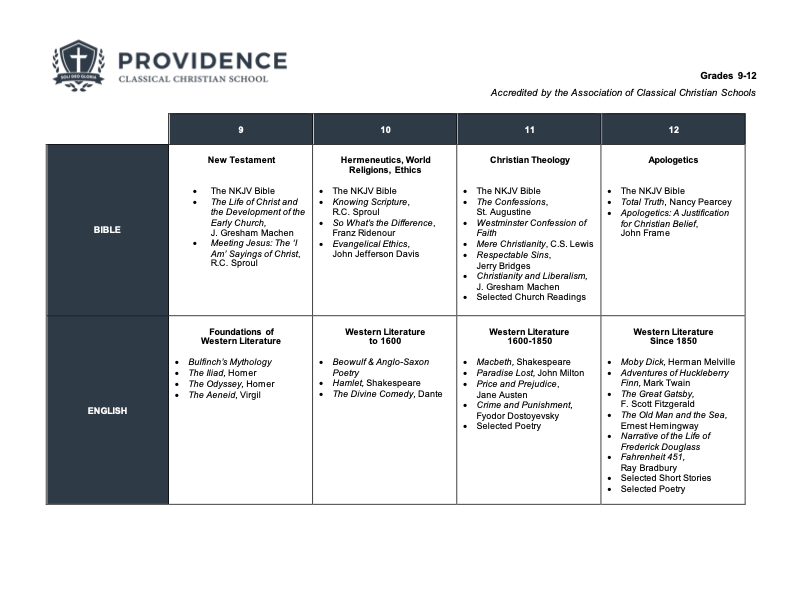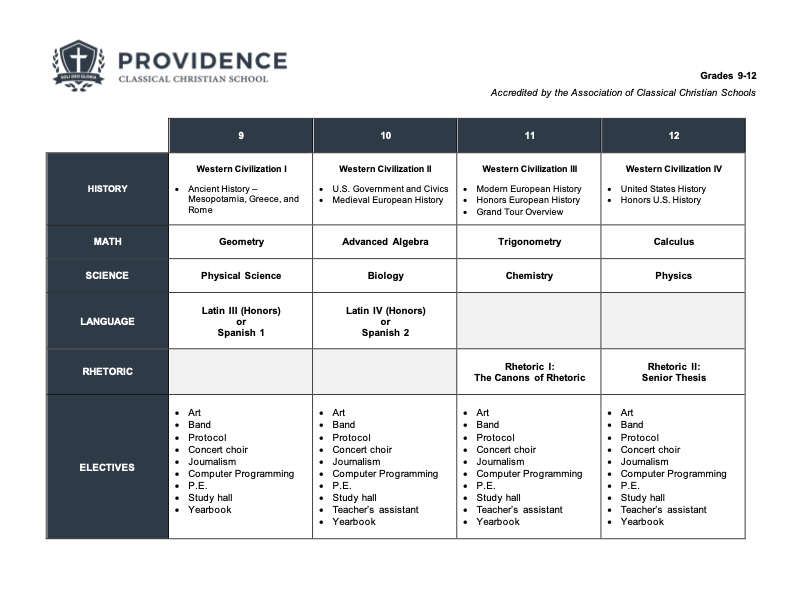High school (9-12)
High school at Providence ranges from 9th-12th grade. These students have a mature excitement about learning and tend to be more reflective. High school students begin to see information as more than mere facts to memorize or analyze using logic and reason. Instead, these students use the information as a tool to better understand the world around them and to interact with others more meaningfully. High school students take 2 years of rhetoric, which culminates in a Senior Thesis–which includes a well-reasoned written argument on a debatable topic and a presentation to memorize and defend before a panel of judges.
Discipline, order, and decorum are still important in secondary classrooms, but there is also an intentional shift from the formal grammar environment. Secondary teachers develop the strengths of their students through personal attention and challenging academics, as students continue to mature in their ability to think and act biblically. Students are encouraged to express their thoughts and opinions in a wide variety of formats.
Activities
High school students are engaged in the community of their houses and the entire school, while advancing their academics and preparing for their next steps.
- House system. Students from 7th-12th grade are divided into six houses and they remain in these houses until they graduate. The house system provides camaraderie, culture, and traditions—students, faculty, and families come together for various activities that cross ages and grades and give students a sense of honor, teamwork, sacrifice, and responsibility in keeping with their growth as young Christian men and women.
- Grand Tour. In the summer between their junior and senior years, students travel to Greece and Italy on a Grand Tour to experience and encounter first-hand some of the most important cities, art, architecture, and history of western and Christian heritage. In the fall, students get more rhetorical training because they must formally present to their schoolmates and parents during a school assembly about the marvelous and wonderful experiences from the tour. This also inspires their younger schoolmates with a greater love for scripture, history, literature, art, and their own future Grand Tour.
- Senior Thesis. Students draw on the speaking, writing, and reasoning skills they have gained for this capstone event. Seniors write a paper (~15 pages) that defends a self-selected, debatable thesis, and they must memorize and orally present their thesis to a panel of judges, who challenge their ability to evaluate an issue against Scripture and who challenge the breadth and depth of their research and original thought. It is a challenging but edifying project that tends to showcase the fruit of classical, Christian education. Examples:
- College preparation. The Providence college advisor takes a personalized approach to advising students through college admissions to help students and their parents make the best-informed decision about which college best fits the gifts, needs, and abilities of each individual student. This process continues throughout the high school years so students and parents can have confidence in how the process works and where their student should go next.
Curriculum
Here is a sample of what students learn in high school:

Other Resources
You can learn more about the classroom supplies, reading lists, and activities for high school on the Secondary Class Resources page.
